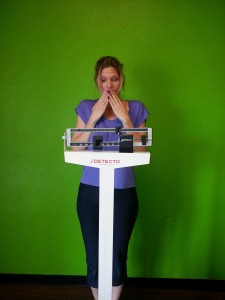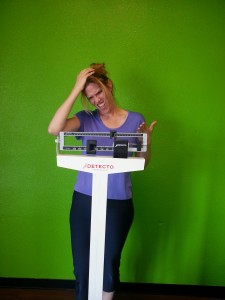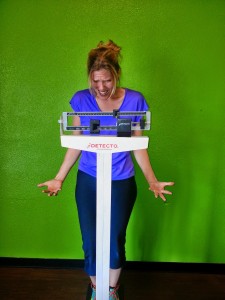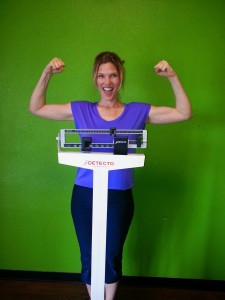At my 35th birthday party this year, we were talking workouts and nutrition and one of the guys at the party asked me, “T-Moo, so how much do you weigh….around 160?” I fired back quickly and defensively, “Hell No…like between 145- 148…I don’t weigh 160. Do I look like I weigh 160 to you?”
Now, you have to realize that I have no problem telling people my weight if they ask, because I’m not ashamed of the number, but what was weird and even shocking to me, was that it bothered me that someone thought I was heavier than I actually was. Usually people guess me to be lighter than I am, so that is why I was so shocked by him overestimating my weight. So it looks like I still have a little obsession with this number and what it means about the way I look, or the progress that I’ve made over the years.
On a side note, I don’t even think 160 is heavy, and I’ve weighed a lot more than that in my past. However, this incident, having conversations with close friends, and working with lots of clients over the years, has really got me to thinking about our obsession with the scale, the number, and how we make that number mean something about ourselves and our progress. I feel there has to be a better way to track our progress or a different conversation we can start to have with ourselves about the number on the scale.

Have you ever wondered:
Why we are so obsessed with the number on the scale?
Have you ever thought, if I just weigh ____ lbs, I’ll be happy, healthy, or fit?
What does that number even mean, really?
Why do we let it dictate how good or bad we feel about ourselves, determine our moods or self-worth, or how we are doing with our goals and progress towards eating healthy and exercising?
When did this obsession with the number on the scale all start?
I think our obsession probably started with the Height and Weight Chart Tables that all doctors use. You all know what I’m talking about, those tables that say for a certain height you should weigh a certain number of pounds. If you were out of range at your yearly physical, the doctor would tell you, “To be healthy, you need to weigh ____ lbs for your height.” We now refer to this as the BMI (Body Mass Index). Here’s the deal, we now know that there are many factors that come into play that make that chart inaccurate for people, especially athletes and those who workout. It’s called Muscle. Muscle weighs more than fat and can cause a healthy individual with a low to normal body fat percentage appear overweight or obese according to that chart.

Are you letting that number on the scale determine your self-worth or progress? Maybe it’s time to throw out your scale!
That number doesn’t DEFINE YOU as a person or even your PROGRESS, for that matter. There will be times when we do everything according to plan and the scale won’t budge or it may even go up. That doesn’t mean that you didn’t have progress that week. There are so many factors that affect our weight like water retention, salt intake in food, &/or hormonal fluctuations. Our weight flucuates throughout the day and all week long, so if you have to know your number, weigh once a week, on the same day, and at the same time, to get the most accurate measure.
The number on the scale doesn’t have to dictate our moods and feelings of self-worth. If we don’t lose weight one week or gain weight for that matter, that doesn’t have to make us feel like we aren’t good enough, guilty, or that we have to be even better next week. We can’t give this much POWER to a NUMBER. We have to move forward feeling confident that we are taking steps to eat healthy and exercise “BECAUSE” our “HEALTH” matters to us!
Take on the Mantra: I eat healthy and exercise because my overall health is more important to me than that number on the scale. #becausehealthmatters
 However, If you find yourself discouraged every time you step on the scale and it makes you want to give up all together, or sends you into a deprivation dieting/over-exercising cycle, try measuring your PROGRESS with some of the following options instead:
However, If you find yourself discouraged every time you step on the scale and it makes you want to give up all together, or sends you into a deprivation dieting/over-exercising cycle, try measuring your PROGRESS with some of the following options instead:
1. Progress Pics.
You can take them yourself, but it is better to have a friend, lover, or spouse do this so that you can get the whole body at the right angles. It’s best to do these every 4-6 weeks. Use the same swimsuit or bra/shorts, and do them in the same place with the same lighting for the best results. Progress pics are great because you really see the changes that your body makes over time that you don’t see gradually happening when you see yourself every day in the mirror. Remember, no one has to see these pics but you. You do not have to share them. So don’t be shy….start posing!
Women = you want your body to start looking more like an hour glass shape hips and shoulders balanced and smaller waist.
Men = want more of a V shape. Wider in the shoulder, chest, and back, and then slimmer through the hips.
2. Circumference Measurements.
If your circumference measurements are going down, most likely, your clothes will be fitting better, too. WIN! WIN! Circumference measurements can be taken every 4 – 6 weeks. It’s a great way to see how your body is changing.
Do your measurements at the same spot every time. You can do them yourself or ask a friend to help you.
Women: Arm, Chest, Waist, Hips.
Men: Arm, Chest, Belly Button, and Hips
3. Tune into how you are FEELING!
Since you started eating healthy and exercising, do you feel more energetic, stronger, able to do your activities of daily living (cleaning, carrying groceries, yard work, etc.) better or for longer without taking breaks. If you have more energy and are able to do more things in your daily life, you are making progress.
4. Can you Exercise Longer or Harder? Set Performance Goals.
Are you able to run faster, lift heavier weights, exercise on more days of the week, or able to exercise longer than when you started? Focus on getting stronger, faster, or set performance goals. Set a strength goal, sign up for a 5 K, or try to do more reps of an exercise in a given amount of time. This helps to give us a reason to exercise and to keep us more interested in exercising consistently.
5. Have you stopped or decreased certain Medications?
This is a big progress marker. If you are able to reduce or stop any medications as it relates to cholesterol, blood pressure, or Diabetes, this is way more important than a few extra pounds or what the number on the scale says. Or better yet, be proactive with our health so that we don’t have to start taking medications in the first place. The less medication that we have to take, the better for our overall health.
6. Set and Track Behavior Goals instead of Outcome Goals.
This is one of my favorite ones. Instead of setting a goal of, I will lose 2 pounds this week, set a goal like, I will exercise 3 times this week, or I will include veggies at every meal this week. Behavior goals allow us to just check the box of whether we did it or didn’t do it. We stop focusing on the weight loss goal and can start to feel good about the positive behaviors and new habits we are incorporating and the positive changes they are making.

What if we just got on the scale and got excited about the number? Flexed our muscles and were like, “Yeeeeeaaaahh, That’s Right…I weigh 148 lbs of AWESOMENESS!”
In closing, if you can’t get on the scale with a more positive attitude, then I invite you to give one of the other 6 Progress Tools I mentioned above a shot. You may be pleasantly surprised that once you start focusing on other ways to track your progress, that the number on the scale starts to go down; once you stop focusing on it and giving it so much meaning. However, you won’t know until you give it a try. Whose in?
Thanks for stopping by,
Tommie
Did you know that I give most of my tips, tools, and insights on fat-loss, nutrition, meal plans, workouts, and mindset via Email to my #fitandfab tribe? If you like what you’re reading, you’ll love my Emails! Get on the list HERE.